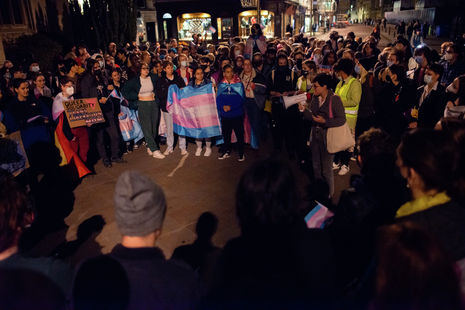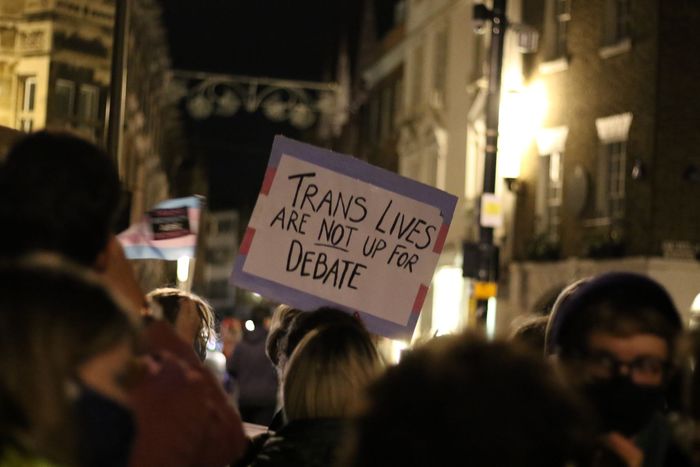No Terfs on our turf
Joyce shouldn’t have been in Cambridge and the University continues to fail trans students

To exist in Cambridge is to be surrounded by great minds, but it’s also to exist alongside some of the most insufferable narcissists. Within the University and in the UK on the whole, we’ve witnessed the self victimisation of bigots who have weaponised supposed threats to free speech to sell books complaining about this. Unfortunately the reality remains that these ‘deprived’ groups are privileged into the most visible positions within the British media and the university.
The invitation of Joyce to speak at the University this week is a reflection how the interests of the university remain protecting and promoting a reactionary right-wing agenda over its marginalised students. It was encouraging to see such a wide-spread demonstration of solidarity of hundreds of students and people from outside of the University gathered today, but it shouldn’t require such an organisational effort by students to oppose this. The university should be dedicating time to improving the welfare, safety and happiness of its trans staff and students, and students shouldn’t have to demand to not have hate speech on our campus.
I had concerns that writing this would further stoke a supposed ‘culture war’ at the university. But the reality is that when these ‘culture wars’ have material consequences for students, they must be recognised as dangerous as they are. The talk was hosted to make the point that in the name of free speech, these fellows still have the power to welcome hate speech and advocate against the rights of trans students without consequence.
Joyce’s lies are unsupported by academia – and it’s a stain on the academic integrity of the University to promote it as such. I don’t want to give more time than is due in debunking her inaccurate and horrendous claims, but for those unfamiliar with Joyce’s writing, she has advocated for the “reduction” of the number of people transitioning in the UK. Joyce has also used antisemitic tropes, citing known dog-whistles of a “global agenda” and singled out Jewish donors to organisations promoting trans-rights in attempts to mobilise anti-trans feelings in the UK. This kind of rhetoric should not be given space at Cambridge. There has been a concerted effort in the UK by the far right to position transphobia as a mainstream and popular opinion – and the University is actively contributing to this by hosting these speakers.
It was a lecture delivered to an audience that agreed with the contents
The University therefore has an obligation and a duty of care to promote the dignity and welfare of its trans students and staff. This has been left to student organisers and the community. The University must listen to its LGBTQ+ students and staff to learn how it can best support them to not just be safe, but to flourish here. At a very basic level this means an end to platforming hate speech.
Despite the condemnation of the talk by the master and senior tutor, unfortunately stern words do not go far enough to protect their students. Despite attempts to wipe their hands of the talk by Caius college (citing it being a private event hosted by a Caius fellow), the choice to simply not host the talk was one that was available. Let us not forget, it was just last year that Caius agreed to U-turn on their policy not to fly the progress flag. Solidarity with trans students across the university is only expressed by the University when convenient.
It will have to be students, staff and the wider Cambridge community, therefore, who oppose and organise against transphobia in every way possible (and the Cambridge SU LGBT campaign, and trans-activists across Cambridge, are already leading on this). The backlash has already been weaponised by Joyce calling for support on Twitter for the talk, and an open letter to the master and senior tutor of Caius complaining about being called offensive, and being silenced – despite the talk literally still taking place.
And we’ve seen in the past that deplatforming works. With the removal of Andrew Tate from Tiktok, his popularity plummeted. Immediately, the harm that was coming from the sharing of his misogynistic views, largely to a young impressionable audience, was reduced. The solution when confronted with hate speech is not to ‘out-debate’ these ideas, or pander to the idea that it can even be intellectualised, but to stop the spread of violence. It is ludicrous already to suggest that this evening was about good debate considering it was a lecture delivered to an audience that agreed with the contents. When one side clearly remains in control of knowledge production and is empowered to spew lies, whilst the other side is left to defend their existence and advocate for basic rights, it cannot be considered debate. There is much historical precedent to suggest that there are dangerous consequences for those that continue to engage with the far right in such a manner.
Joyce wrote, “Why not tell me to my face that I’m offensive” and to that I say, the hundreds of people who gathered to protest the talk did just that. We told her to her face that transphobia and bigotry is not welcome in Cambridge. It’s time for the University to do that too. This will never be just about Joyce, with every bigoted speaker expected to make an appearance this term including Charlie Kirk and Kathleen Stock, we will continue to fight against transphobia on our streets.
 News / Reform candidate retracts claim of being Cambridge alum 26 January 2026
News / Reform candidate retracts claim of being Cambridge alum 26 January 2026 Interviews / Lord Leggatt on becoming a Supreme Court Justice21 January 2026
Interviews / Lord Leggatt on becoming a Supreme Court Justice21 January 2026 News / Report suggests Cambridge the hardest place to get a first in the country23 January 2026
News / Report suggests Cambridge the hardest place to get a first in the country23 January 2026 Comment / How Cambridge Made Me Lose My Faith26 January 2026
Comment / How Cambridge Made Me Lose My Faith26 January 2026 Features / Are you more yourself at Cambridge or away from it? 27 January 2026
Features / Are you more yourself at Cambridge or away from it? 27 January 2026










